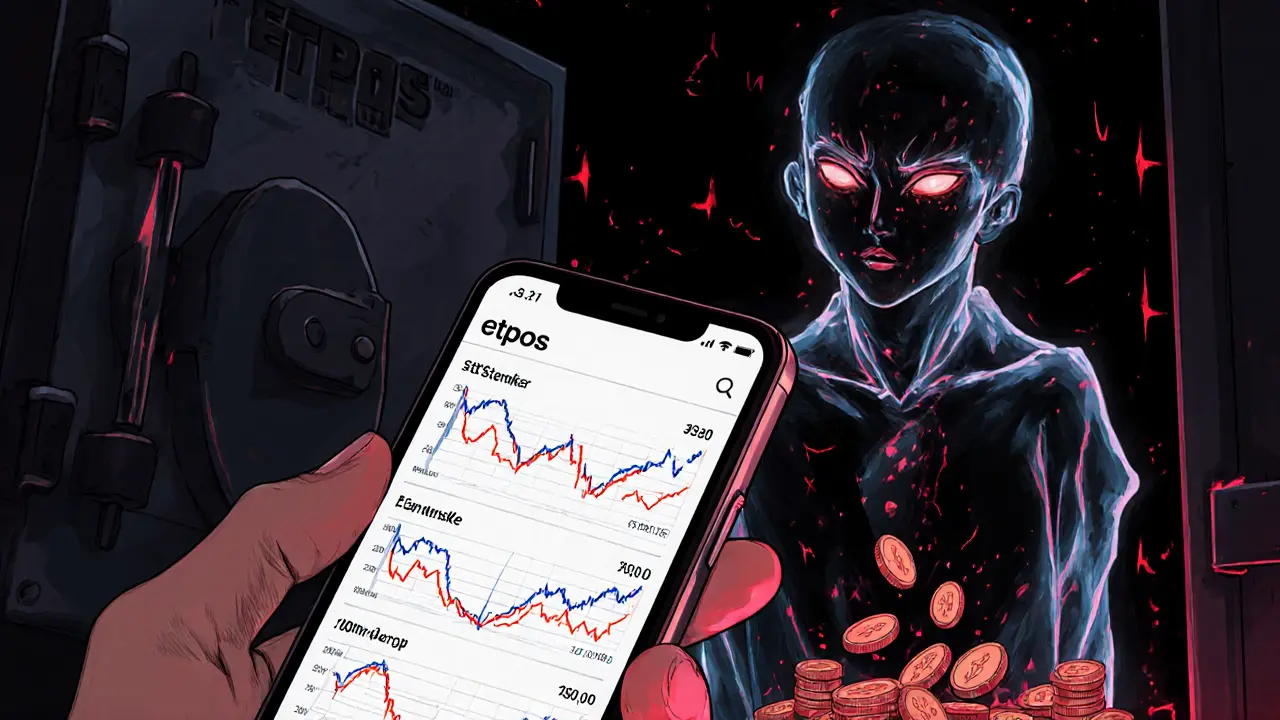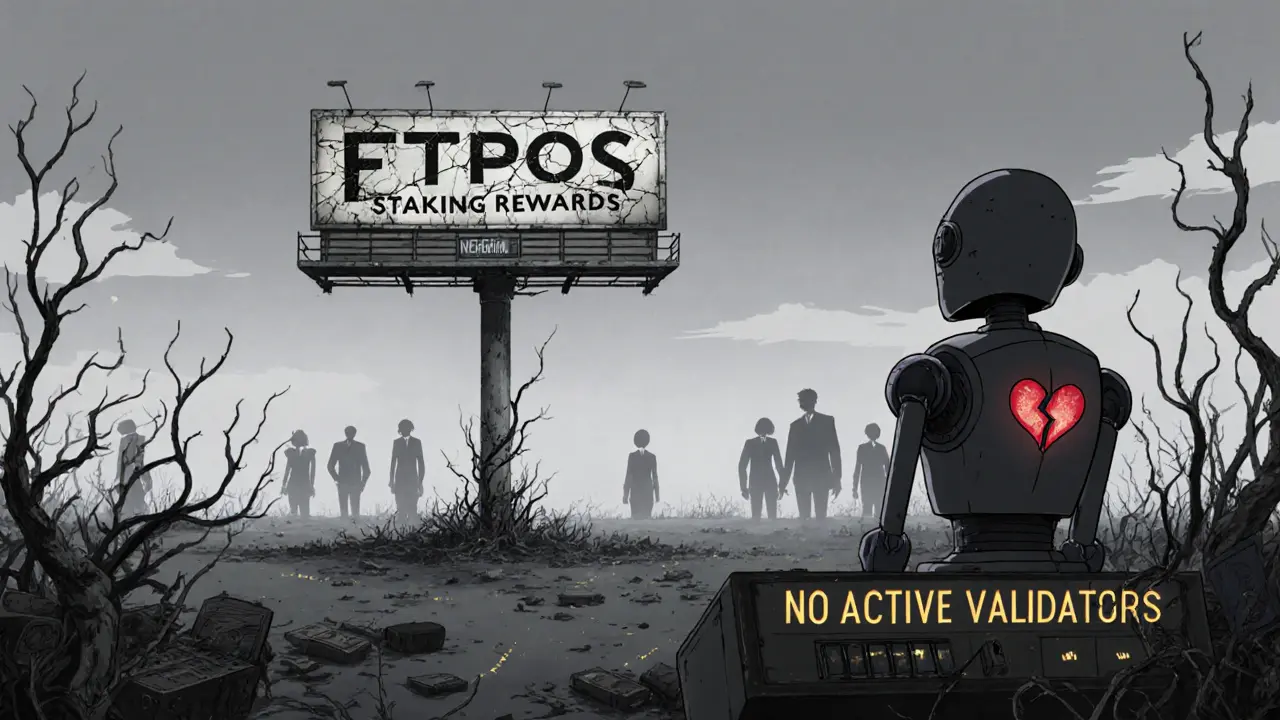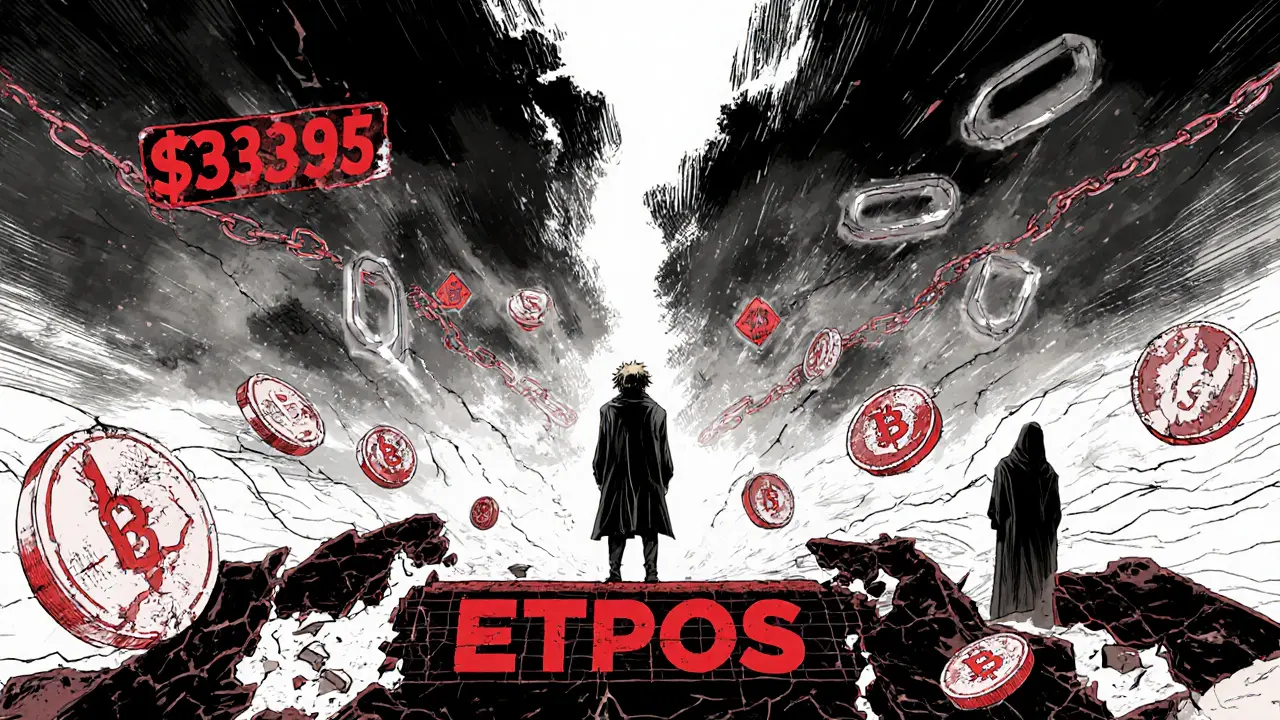ETPOS Investment Risk Calculator
Calculate Your Potential Loss
Based on the article data: ETPOS has extreme volatility (98.97% crash potential), minimal liquidity (under $80 daily volume), and high risk of being manipulated.
Ever heard of EtherPOS (ETPOS) and wondered if it’s just another crypto gamble or something real? Let’s cut through the noise. EtherPOS is a BEP-20 token on the BNB Smart Chain that launched in January 2023. It claims to be building a secure computing platform and a validator network where you need to hold ETPOS tokens to earn new coins. Sounds promising? Maybe. But here’s the truth: EtherPOS is one of the most uncertain, low-liquidity tokens in the entire crypto space - and the data doesn’t lie.
What EtherPOS actually is (and isn’t)
EtherPOS isn’t a blockchain. It’s not even a full project with a working product. It’s a token - a digital asset built on top of Binance’s BNB Smart Chain, using the BEP-20 standard. That means it runs on the same network as thousands of other tokens, including big names like PancakeSwap and SafeMoon. But unlike those, EtherPOS has no real infrastructure, no public roadmap, and no active development team you can verify.
The project says it wants to create a validator system where holders lock up ETPOS to help secure the network and earn rewards. But there’s no public validator dashboard, no staking portal, no documentation on how to join, and no minimum stake requirement. If you can’t even find out how to participate, it’s not a system - it’s a promise with no delivery.
The wild price swings and conflicting data
The price history of ETPOS is a rollercoaster with no safety rails. CoinMarketCap says it hit an all-time high of $34.95 in January 2024. Then it crashed - 98.97% down. That’s not a correction. That’s a collapse. Coinlore says the peak was $6.40. CoinCarp says $1.22. Which one’s right? No one knows. The data across platforms doesn’t match because there’s no centralized exchange listing it properly.
As of November 2025, ETPOS trades between $0.20 and $0.36 depending on which site you check. Trading volume? Sometimes under $80 a day. Other times, it jumps to $2,500. Why? Because it’s likely traded on a handful of tiny, unregulated decentralized exchanges (DEXs) with no oversight. That kind of volatility isn’t market-driven - it’s pump-and-dump territory.
Supply numbers that don’t add up
The token has a max supply of 100 million ETPOS. Sounds big? Here’s the problem: CoinMarketCap says the circulating supply is 109,410 - but also says total supply is 0. Coinlore lists circulating supply as “0?” with a question mark. That’s not a typo. That’s a red flag. If the people tracking the token can’t even agree on how many are in circulation, you can’t trust any of the numbers.
And then there’s the fully diluted valuation (FDV) - $35.9 million according to CoinMarketCap. But the actual market cap? Just $39,280. That means less than 0.1% of the total supply is out in the market. The rest? Probably held by the creators. That’s a classic setup for manipulation. If they decide to dump even 1% of their holdings, the price could vanish overnight.

Security warning: The contract can be changed anytime
Here’s the scariest part: CoinMarketCap explicitly warns that the EtherPOS smart contract can be modified by its creator. That means the team behind it can:
- Disable selling - trapping your tokens forever
- Change transaction fees - making it impossible to trade
- Mint new tokens - diluting your holdings without warning
- Transfer your tokens - stealing them remotely
This isn’t a rare issue. It’s common in low-tier tokens. But when a project has no transparency, no team identity, and no track record, this becomes a dealbreaker. You’re not investing in a company. You’re betting on anonymous code that can be changed at any moment.
No exchanges. No liquidity. No community
CoinGecko says ETPOS is “unavailable to trade on exchanges listed on CoinGecko.” That’s a huge deal. CoinGecko tracks hundreds of exchanges - including Binance, KuCoin, and OKX. If it’s not on any of them, you can’t buy it safely. Other sites claim it trades on small DEXs, but even those reports are inconsistent.
Holder.io, a token tracker, bluntly says: “EtherPoS is awaiting listing on exchanges” and “Today EtherPoS (ETPOS) not traded anywhere.” Meanwhile, CoinCarp reports $2,300 in daily volume. Which is it? The truth is, no one knows for sure. That’s not ambiguity - it’s chaos.
And there’s no community. No Reddit threads. No Telegram group with active members. No Twitter updates. No GitHub commits. No YouTube explainers. Nothing. If a project has no users talking about it, it has no future.

Why EtherPOS exists - and who it’s for
EtherPOS doesn’t solve a real problem. It doesn’t compete with Chainlink, Quant, or any established blockchain security platform. It doesn’t offer anything new. It’s not even trying to. It’s a micro-cap token with zero fundamentals, built to attract speculative buyers who chase “the next big thing.”
It’s designed for one group: people who don’t do research. The kind who see a price spike on a sketchy chart, hear a whisper on a Discord server, and throw in $50 hoping to get rich. The reality? 99% of people who buy tokens like this lose money. The ones who profit? Usually the creators.
Should you buy EtherPOS?
No. Not because it’s illegal. Not because it’s a scam (though it’s dangerously close). But because it’s a high-risk gamble with no upside.
If you’re looking for exposure to blockchain security, look at Chainlink (LINK), which powers real-world data feeds for smart contracts. If you want staking rewards, try Ethereum, Solana, or even Binance’s own BNB. These projects have teams, audits, user bases, and transparent roadmaps.
EtherPOS has none of that. It’s a ghost token - with fake data, no liquidity, and a contract that could erase your investment in seconds. Even if it somehow rises 10x tomorrow, you’ll still be stuck on a DEX with no way to cash out. And if the team vanishes? Your tokens become worthless digital paper.
The only reason to hold ETPOS is if you’re comfortable losing every dollar you put in - and you’re okay with being part of a statistical outlier. Most people who buy tokens like this don’t make money. They just fund someone else’s exit strategy.
Final reality check
EtherPOS (ETPOS) is not a cryptocurrency you invest in. It’s a warning sign. A case study in how not to build a crypto project. It has no utility, no transparency, no liquidity, and no future. The data is conflicting. The risks are extreme. The chances of any return are near zero.
If you’re curious about crypto, start with projects that have real teams, real audits, and real users. Don’t chase ghosts. The market is full of them - and they’re not here to make you rich. They’re here to take your money.
Is EtherPOS (ETPOS) a scam?
It’s not officially labeled a scam, but it has nearly all the red flags: no verified team, unmodifiable contract, zero liquidity, conflicting data, and no community. These are hallmarks of high-risk, low-integrity tokens. Treat it like a gamble - not an investment.
Where can I buy EtherPOS (ETPOS)?
You won’t find it on major exchanges like Binance, Coinbase, or KuCoin. Some smaller decentralized exchanges (DEXs) may list it, but trading volumes are extremely low and unreliable. Even if you buy it, selling later could be impossible due to lack of buyers.
Can I stake EtherPOS to earn rewards?
The project claims to have a validator system, but there’s no public staking portal, no documentation, and no way to verify participation. Without clear instructions or a working system, staking is not possible. Any claims of earning rewards are speculative at best.
Why do different websites show different prices for ETPOS?
Because ETPOS trades on multiple unregulated DEXs with minimal volume. Each site pulls data from different exchanges, and some sources may be outdated or manipulated. The lack of a single, reliable trading venue causes wild inconsistencies in price and volume reporting.
Is EtherPOS worth holding long-term?
No. With a market cap under $40,000, no development updates, and no community, there’s zero chance of long-term growth. Tokens like this rarely survive more than a year. Most disappear quietly after the creators cash out. Don’t hold it hoping for a miracle.


18 Responses
this token is a ghost story with a blockchain logo. i saw someone post a screenshot of their '1000x gain' and thought they were trolling. turns out they were serious. yikes.
i get why people chase these things. the dream of flipping $50 into $5000 is intoxicating. but this isn't investing, it's gambling with extra steps. real crypto projects don't hide their team, their code, or their supply. they put it all out there because they're confident. ETPOS? They're scared you'll look too closely.
The data inconsistencies are particularly alarming. CoinMarketCap's circulating supply of 109,410 with a total supply of 0 is not merely an error-it is a systemic failure of transparency. Without verifiable on-chain metrics, any valuation is speculative fiction. One cannot assess risk without reliable data.
so you're telling me some guy in a basement coded a token with a contract he can change anytime and now people are calling it 'the next big thing'? bro. just stop. you're not investing. you're handing cash to a stranger who doesn't even have a github profile.
I've seen this movie before. The price spikes. The Discord gets loud. Then silence. The team vanishes. The wallet gets drained. Don't be the last one holding the bag.
i mean... i get it. i looked at etpos last year when it was at $1.20 and thought 'maybe this is it?' but then i checked the contract and saw the renounce function wasn't called and the owner key was still active. and the volume was less than my coffee budget. i just walked away. not because i'm smart, but because i don't wanna cry over crypto.
if you're new to crypto, please don't start here. i know it's tempting to jump on something that looks like it's going up. but this isn't a startup you can talk to the founder about. this is code on a chain with no face, no name, no accountability. protect your money. find something real.
wow. someone actually spent time writing this whole thing. did you get paid to do this? or are you just that bored? congrats. you just wrote a 2000 word essay on a token that's worth less than your last Uber Eats order.
this is why i always say: if it doesn't have a whitepaper with real engineers listed, a GitHub with weekly commits, and a Discord with more than 3 active members, it's not a project-it's a lottery ticket with extra steps. ETPOS? More like ETLOST. lol.
the fact that the contract can be modified at will is the most damning detail. this isn't decentralization. this is centralized control with a blockchain veneer. the team could drain the liquidity pool tomorrow and no one could stop them. this isn't a token. it's a honeypot. and you're the fly.
I saw someone on Telegram say they made 1200% on ETPOS. I asked for proof. They ghosted me. Then I checked the DEX. 12 trades in 48 hours. 12. That’s not a market. That’s a party of 3 people and a bot. This isn’t crypto. This is a magic trick with a wallet.
In India, we have a phrase: 'jugaad'. It means fixing something with duct tape and hope. ETPOS is the jugaad of crypto. It works until it doesn't. And when it doesn't, you're left with nothing but a broken promise and a wallet full of ghosts.
you people act like this is some big revelation. every week there's a new 'next big thing' that turns out to be trash. if you're not already rich, you're not smart enough to be in crypto. go back to your 9-to-5. or at least invest in something with a name you can spell.
i used to think crypto was about innovation. now i think it's about psychology. people don't buy tokens because they understand them. they buy them because they want to believe. ETPOS is a mirror. it shows you what you're willing to hope for. sad, but true.
this is why america needs to regulate this nonsense. you let some anonymous dev create a token with a backdoor, and now ordinary people are losing their rent money. this isn't freedom. this is exploitation dressed up as innovation.
i wonder if the creators of ETPOS ever wake up in the middle of the night and feel guilty. like, do they stare at the ceiling thinking 'man, i tricked 200 people into buying digital trash'? or do they just laugh and buy another yacht?
the most dangerous part of tokens like this isn't the price drop. it's the false hope they create. people start believing they can outsmart the system, that they're the exception. but the system isn't broken-it's designed exactly this way. the only winners are the ones who built it. everyone else is just fuel.
I can't believe people still fall for this. After all the scams, all the rug pulls, all the stories of people losing their life savings-somehow, someone still thinks this time it's different. You're not special. You're just another data point in their exit strategy.